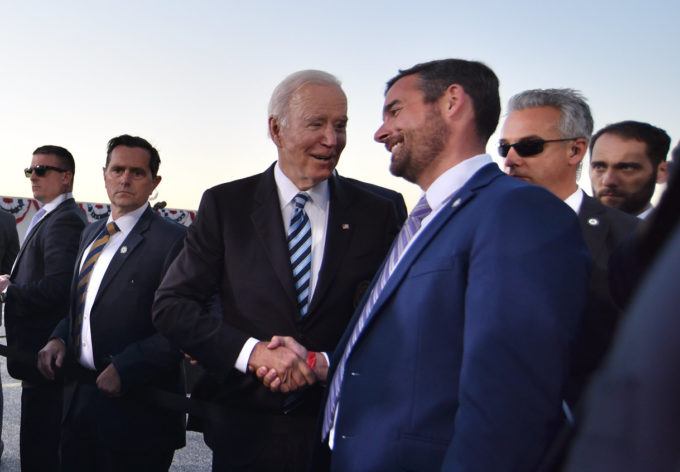
Photograph Source: Maryland GovPics – CC BY 2.0
President Biden was swift to claim credit for the killing by US Special forces of the Islamic State leader, Abu Ibrahim al-Hashimi al-Qurayshi, in northwest Syria. As with his more famous predecessor, Abu Bakr al-Baghdadi two years ago, he is reported to have died in a house in the anti-Syrian government enclave of Idlib, close to the Turkish border.
Islamic State (IS) is much reduced from the all-conquering force it was for several years after 2014 when it had surprised the world by capturing the city of Mosul in northern Iraq. It went on to seize an area the size of Great Britain in western Iraq and eastern Syria, but lost all this territory between 2016 and 2019. The fact that al-Qurayshi was killed so far from previous IS strongholds may indicate that the movement no longer has any bases that it considers secure.
But as a guerrilla group that no longer tries to hold territory, it has recently shown renewed strength with an attack on a prison in Hasakah, a Kurdish controlled city in north east Syria. IS leaders who had escaped the prison were at first believed by locals in Idlib to be the target of the US raid.
Al-Qurayshi was an obscure figure who took over from al-Baghdadi after the latter was killed in similar circumstances in October 2019. He is believed to have been a member of the Sunni Turkman population in Tal Afar, north west of Mosul, a town which was notorious for its Shia-Sunni antagonism and the militancy of the Sunni majority.
Biden will hope to gain political points from the death of al-Qurayshi, showing him as a decisive and effective leader and dispelling memories of the debacle in Afghanistan last August. But such killings of high profile jihadi leaders have seldom done much visible damage to their movements in the past. President Donald Trump exulted over the death of al-Baghdadi, but there is little sign that this had much operational – as opposed to symbolic – impact on IS.
President Barack Obama and his Secretary of State, Hillary Clinton, likewise sought to associate themselves closely with the killing of Osama bin Laden in Pakistan in 2011. But the success of this type of jihadi movement largely came after his death thanks to changes in the political landscape in the Islamic world.
Islamic State and al Qaeda have put martyrdom for the faith at the centre of their version of Islam so they are less vulnerable than most movements to being demoralised by the death of their leaders.
IS has shown signs of rejuvenation in recent months, of which the attack on the prison in Hasakah – which sparked a 10-day battle – is the most impressive evidence. It has hide-outs, supplied with arms, ammunition and food, along the Syrian-Iraqi borderlands and in the deserts of eastern Syria and northern Iraq, south of Kirkuk. From these small, but well-hidden bases, IS fighters can stage guerrilla raids on government outposts and villages, where they takeover at night and kill those who oppose them.
A strength of IS is that government authority is fragmented in Syria and Iraq, enabling jihadis to take advantage of divisions in the lands disputed between Kurds and Arabs in Iraq. In Syria, the divisions are even greater with the country split between President Bashar al-Assad’s government-held areas, the Kurdish zone in the north east, and the anti-Assad rebel enclave of Idlib, with a population of three million, two thirds of them living close to the Turkish border. This region is effectively under the control of Hayat Tahrir al-Sham (HTS), the extreme Islamist group that long ago split from IS but has a similar ideology and methods of operating.
IS has many offshoots in Africa and elsewhere in Asia, but central control is neither necessary nor feasible. Isis-k in Afghanistan blew up 13 American soldiers at Kabul airport last August and many of the 170 Afghan civilians who also died. Unlike the Taliban, Isis sees itself as an international movement, recruiting foreign fighters, and seeking a foothold in every country in the world. Usually these are places where the state is weak and – as in Syria, Iraq and Afghanistan – the population impoverished.



